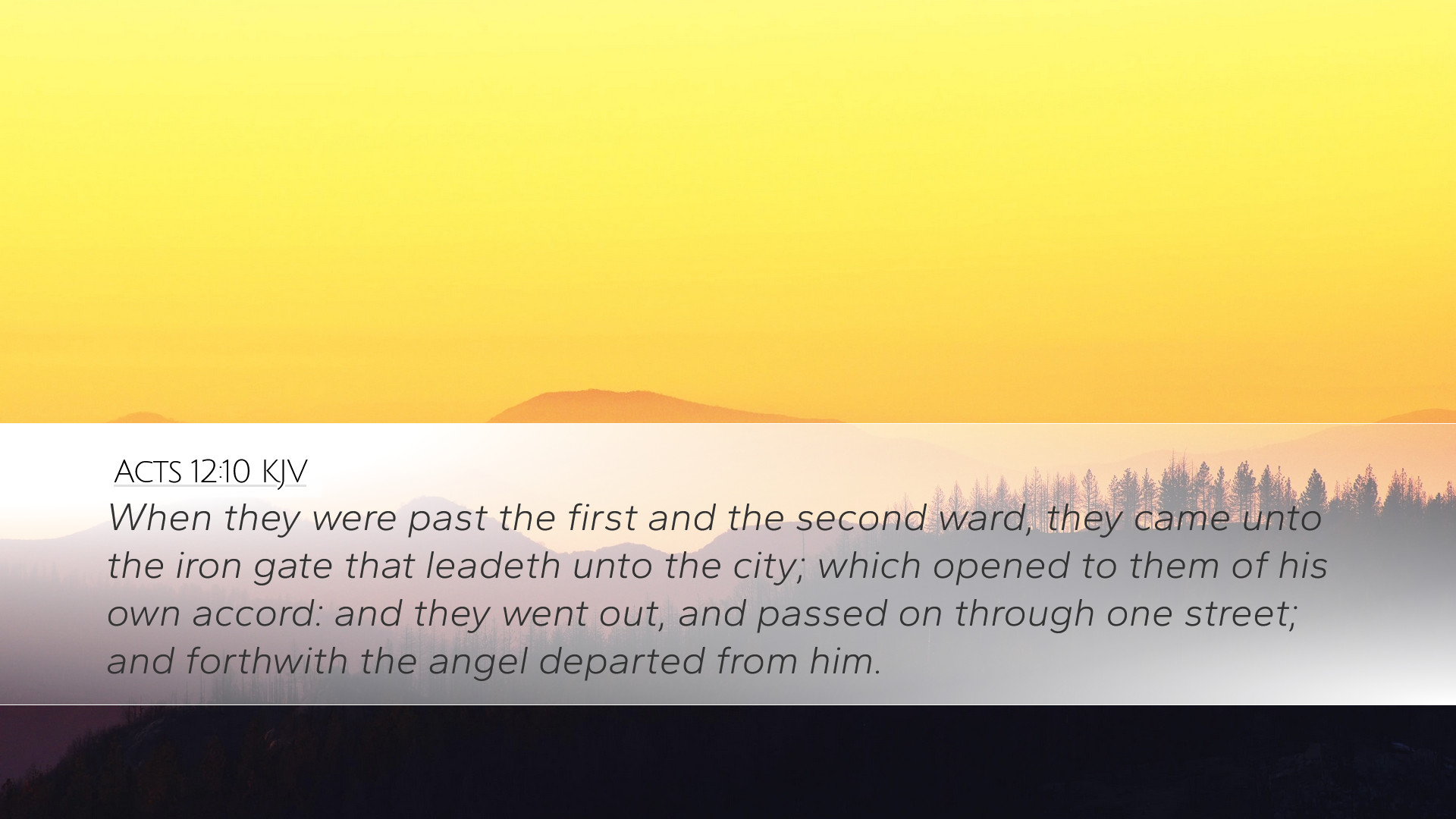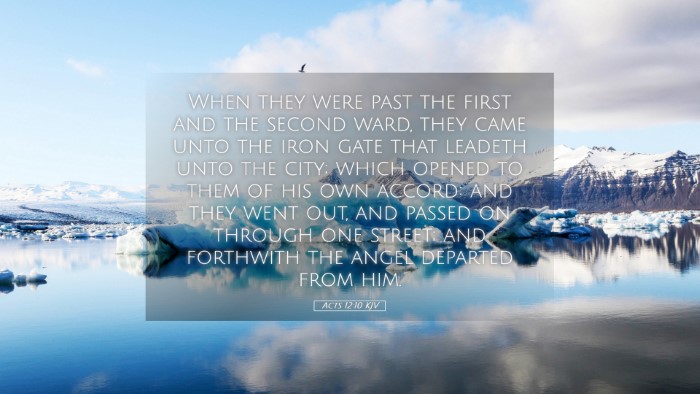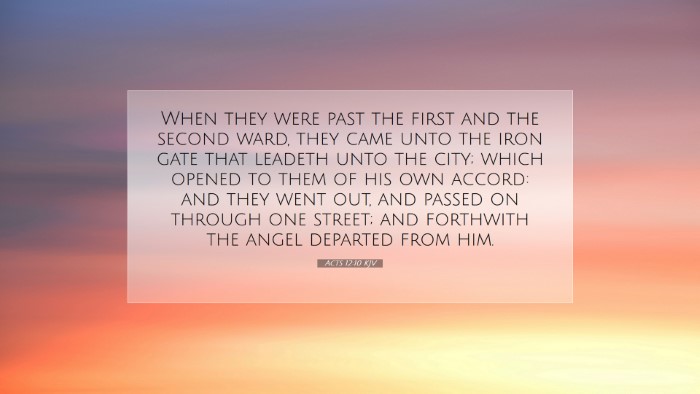Old Testament
Genesis Exodus Leviticus Numbers Deuteronomy Joshua Judges Ruth 1 Samuel 2 Samuel 1 Kings 2 Kings 1 Chronicles 2 Chronicles Ezra Nehemiah Esther Job Psalms Proverbs Ecclesiastes Song of Solomon Isaiah Jeremiah Lamentations Ezekiel Daniel Hosea Joel Amos Obadiah Jonah Micah Nahum Habakkuk Zephaniah Haggai Zechariah MalachiActs 12:10
Acts 12:10 KJV
When they were past the first and the second ward, they came unto the iron gate that leadeth unto the city; which opened to them of his own accord: and they went out, and passed on through one street; and forthwith the angel departed from him.
Acts 12:10 Bible Commentary
Commentary on Acts 12:10
Verse: "When they were past the first and the second ward, they came unto the iron gate that leadeth unto the city; which opened to them of his own accord: and they went out, and passed on through one street; and forthwith the angel departed from him." (Acts 12:10)
Introduction
The passage in Acts 12:10 is a significant moment within the narrative of Peter's miraculous escape from prison. This event is set against the backdrop of King Herod's persecution of the early Church, highlighting themes of divine intervention, faith, and the power of God over earthly authorities. In this commentary, insights from notable biblical commentators such as Matthew Henry, Albert Barnes, and Adam Clarke will be synthesized to provide a comprehensive understanding of the verse.
Exegesis of the Text
Contextual Background: The events leading up to this verse describe Peter's imprisonment following the execution of James, the brother of John. The Church is in fervent prayer for Peter, offering a narrative of desperate faith juxtaposed with the harsh realities of early Christian life under persecution.
Divine Agency: Matthew Henry emphasizes the role of divine agents in this passage—most notably the angel of the Lord. The angel not only facilitates Peter's escape but also serves as a reminder of God's omnipresence and sovereignty over human affairs. Having passed through two wards signifies that Peter’s deliverance is thorough, removing any barriers that stand before God’s purpose.
The Iron Gate: The iron gate mentioned is symbolic of the formidable challenges Peter faces. Albert Barnes reflects on the significance of this gate opening "of its own accord," interpreting it as a sign of God's miraculous power. Such occurrences portray that when God intends to liberate His people, even the strongest barriers are rendered powerless. The miraculous opening of the gate indicates that the Lord goes ahead of His servants, preparing a way for them.
Theological Implications
Faith and Deliverance: The passage highlights themes of faith and deliverance. Adam Clarke notes that Peter's escape was not merely physical but also spiritual. The encouragement to followers of Christ is profound—prayers offered in faith can lead to miraculous interventions, especially in the face of opposition. The assertion that "they went out" suggests active participation in the deliverance process; it requires faith to act on God’s promises.
Human Response to Divine Action: The Church's fervent prayer prior to Peter's liberation underscores the urgency and importance of intercession. It is through their prayers that divine action is set in motion. Clarke elaborates on this point, stressing that while God initiates liberation, human collaboration through prayer is essential. This partnership is a mystery of the divine-human relationship—God orchestrates salvation, yet He seeks the faithful petitions of His people.
Practical Applications
- Encouragement in Trials: For pastors and theologians, this scripture serves as a poignant reminder of God's faithfulness in times of trial. Faith communities can take comfort in knowing that God hears their prayers, even when the situation seems dire.
- The Power of Collective Prayer: The early Church's commitment to pray for Peter suggests the vital role of corporate prayer in the life of the Church today. This should encourage congregations to prioritize prayer as a collective endeavor.
- God’s Sovereignty: This verse affirms that regardless of circumstances—whether oppressive authorities or dire situations—God retains sovereign control. This understanding can encourage believers to trust in God's plans even when they cannot see the way forward.
Conclusion
Acts 12:10 serves as a testament to the power of God’s intervention in the face of human adversity. Insights from Matthew Henry, Albert Barnes, and Adam Clarke illustrate the layers of meaning within the narrative—the need for faith, the efficacy of prayer, and the assurance of God's sovereign will in delivering His people. As we reflect upon this verse, may it inspire a deeper trust in God’s unfailing providence and an earnest commitment to prayer within our communities.


